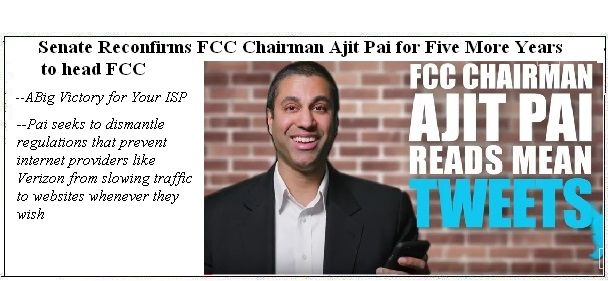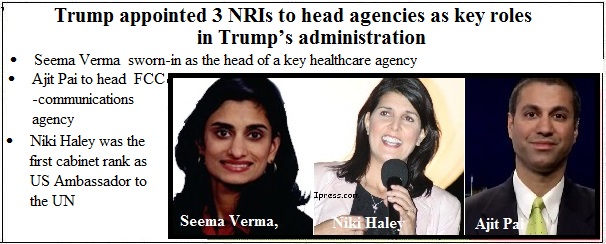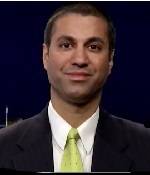|
FCC Chairman Ajit Pai re-elected or Five More Years
A Big Victory for your ISP (Internet service provider).Pai seeks to dismantle regulations that prevent internet providers like Verizon from slowing traffic to websites whenever they wish
10/3/2017
The US Senate today gave Federal Communications Commission Chairman Ajit Pai another term on the FCC.
Pai would have had to leave the FCC at the end of 2017 if the Senate hadn't approved President Donald Trump's request to give Pai a new term. Pai, who has proposed deregulating broadband providers and eliminating net neutrality rules, received a new five-year term retroactive to July 1, 2016.
The Senate vote to give Federal Communications Commission Chairman Ajit Pai another term on the FCC yesterday. Pai's support mostly came from GOP senators, but four Democrats broke ranks.
The final vote was 52-41 in favor of Pai's re-nomination. Pai received yea votes from 48 Republicans while all 41 nay votes came from the Democratic caucus. Seven senators did not vote
Pai seeks to dismantle regulations that prevent internet providers like Verizon from slowing traffic to websites whenever they wish; he’s eager to rollback rules that stop providers from blocking online content at their discretion; and he opposes restrictions on carriers that prohibit them from accepting payments to speed up websites beyond that which their lesser competitors can afford.
---------------------
Indian-American Ajit Pai gets 2nd term as FCC Chairman
Washington, Oct 3, 2017: The US Senate has approved the nomination of Indian American Ajit Varadaraj Pai for a second term as the Federal Communication Commission (FCC) Chairman.
Pai, whose term was to end later this year, was reappointed on Monday for a five-year term after getting a majority of 52-41, with most of the Democrats voting against him as they complained that Pai will undermine net neutrality.
Pai has served as a Commissioner at the FCC since 2012. President Donald Trump had earlier nominated him for another term as Republicans aim at further accelerating their ambitious tech agenda, the American Bazaar online reported.
The FCC is the federal authority regulating cellphone spectrum and services, radio, television, phone, internet and satellite and cable. It also has a major role in controlling the content of television and radio.
Pai was appointed by the new administration as the Chairman of FCC in the wake of Tom Wheeler demitting the office earlier this year. His tenure with the FCC as commissioner received a one-year extension in July 2016, giving him an opportunity to become the FCC Chairman.
Pai, during the beginning of his tenure as FCC Chairman, faced criticism as he said he wanted to end net neutrality, which prevents internet service providers from giving special preferences to certain web sites or accept payment from a web service to give it priority or better access.
After getting re-elected, Pai said he was "deeply grateful to the US Senate and to President (Donald) Trump".
Democratic Senator Ron Wyden warned that Pai "will do an enormous amount of damage to one of the foundational principles of the internet -- net neutrality".
Republican Senator Shelley Moore Capito said: "He truly understands the need to bring more rural communities online and has shown a real commitment to closing the digital divide in America."
Republican Senator Roger Wicker of Mississippi said: "He (Pai) is working to establish the light-touch regulatory framework that allowed the internet to become the marvel of the modern age."
Pai was born on January 10, 1973, in Buffalo, New York, to Konkani immigrants from India. He attended Harvard University in 1994 and the University of Chicago in 1997....IANS
xxxxxxxxxxxxxxxxxxxx
Trump appointed NRI Ajit Pai, FCC chairman to head the US communications regulatory agency
-
Ajit Pai would dismantle net neutrality
-
Chairman Pai calls the “democratization of entrepreneurship.” With a good idea and a broadband connection, entrepreneurs anywhere can compete in ways unthinkable a generation ago.

In January, 2017, President Trump named Ajit Pai, 44, the FCC’s 34th chairman who served on the Commission since 2012. In March 2017, President Donald Trump announced that he would renominate Ajit Pai to serve another five-year term at the FCC, which will require confirmation by the U.S. Senate
- Pai has been a commissioner at the FCC since 2012, when he was appointed by then-President Obama and confirmed by the Senate.
- 2011, Ajit was nominated for a Republican Party position on the Federal Communications Commission by President Barack Obama at the recommendation of Minority leader Mitch McConnell. He was confirmed unanimously by the United States Senate on May 7, 2012 and was sworn in on May 14, 2012 for a term that concluded on June 30, 2016. Pai does not share Obama’s progressive views. Obama would NOT have chosen him to lead the commission, but there’s a tradition of letting the minority party pick two commissioners, since the majority can only legally hold three seats; in nominating Pai
- Pai has been a commissioner at the FCC since 2012, when he was appointed by then-President Obama and confirmed by the Senate. Though an Obama appointee, Pai does not share Obama’s progressive views and is by no means someone Obama would have chosen to lead the commission. Rather, there’s a tradition of letting the minority party pick two commissioners, since the majority can only legally hold three seats; in nominating Pai — at the recommendation of Senate Majority Leader Mitch McConnell, a Republican — Obama was sticking to that tradition.
- 2010, Pai was one of 55 individuals nationwide chosen for the 2011 Marshall Memorial Fellowship, a leadership development initiative of the German Marshall Fund of the United States
- 2007, He served as Deputy General Counsel and had supervisory responsibility over several dozen lawyers in the Administrative Law Division and worked on a wide variety of regulatory and transactional matters involving the wireless, wireline, cable, Internet, media, and satellite industries
- 2003, he was hired as Deputy Chief Counsel to the United States Senate Judiciary Committee’s Subcommittee on Administrative Oversight and the Courts. He returned to the Department of Justice to serve as Senior Counsel in the Office of Legal Policy in May 2004. He held that position until February 2005, when he was hired as Chief Counsel to the Subcommittee on the Constitution, Civil Rights, and Property Rights.
- 2001, Pai left his Department of Justice post to serve as Associate General Counsel at Verizon Communications Inc., where he handled competition matters, regulatory issues, and counseling of business units on broadband initiatives.
Ajit Pai was born on January 10, 1973 in Buffalo, New York. He grew up in rural Parsons, Kansas. Both of his parents came from India and were doctors at the county hospital. He earned a B.A. with honors in Social Studies from Harvard in 1994 and a J.D. from the University of Chicago in 1997, where he was an editor of the University of Chicago Law Review and won the Thomas J. Mulroy Prize. He now lives in Arlington, Virginia, with his wife, Janine; son, Alexander; and daughter, Annabelle.
-----------------------------------------
Ajit Pai would dismantle net neutrality
“I want to commend the U.S. House of Representatives for passing a number of important, bipartisan telecom bills yesterday,” Pai said on January 24.
“These bills will help bring greater efficiency to the Commission, provide consumers with greater protections, improve rural call completion, help Amateur Radio operators, and take several steps to promote public safety,” he continued, adding, “I look forward to working with Congress on these and other important issues as Chairman of the FCC.”
On the day that the Title II Order was adopted, I said that ‘I don’t know whether this plan will be vacated by a court, reversed by Congress, or overturned by a future commission. But I do believe that its days are numbered,’” Pai said. “Today, I am more confident than ever that this prediction will come true.”
- Chairman Pai’s regulatory philosophy is informed by a few simple principles. Rules that reflect these principles will result in more innovation, more investment, better products and services, lower prices, more job creation, and faster economic growth. Consumers benefit most from competition, not preemptive regulation. Free markets have delivered more value to American consumers than highly regulated ones.
- No regulatory system should indulge arbitrage; regulators should be skeptical of pleas to regulate rivals, dispense favors, or otherwise afford special treatment.
- Particularly given how rapidly the communications sector is changing, the FCC should do everything it can to ensure that its rules reflect the realities of the current marketplace and basic principles of economics.
- As a creature of Congress, the FCC must respect the law as set forth by the legislature.
- The FCC is at its best when it proceeds on the basis of consensus; good communications policy knows no partisan affiliation.
Broadband
Broadband is critical in modern American life. Especially when it comes to innovation, the Internet has leveled the playing field. It’s created a phenomenon that Chairman Pai calls the “democratization of entrepreneurship.” With a good idea and a broadband connection, entrepreneurs anywhere can compete in ways unthinkable a generation ago.
Yet too many Americans still don’t have broadband. They are left on the other side of the “digital divide.” Chairman Pai has seen this for himself, from Barrow, Alaska to Fayetteville, West Virginia.
That’s why he has proposed a comprehensive plan to promote broadband deployment to all Americans. The federal government must make it easier to for broadband providers to retire increasingly obsolete copper lines in favor of next-generation technologies like fiber. It must enable rural residents to have the same choice for stand-alone broadband typically found in cities. It must create a roadmap for state and local governments so that companies that want to compete in the broadband market don’t have to jump through unnecessary regulatory hoops in order to lay fiber to consumers. It must promote common-sense policies like “Dig Once” and reform pole attachment rules to reduce the costs of building digital networks. It must streamline the process for deploying wireless infrastructure, from big towers to small cells. It must free up more licensed spectrum for use by wireless carriers and more unlicensed spectrum for things like Wi-Fi. And it must preserve Internet freedom here and abroad, so that the online world can flourish free from heavy-handed government intervention.
First Amendment
Chairman Pai has been an outspoken defender of First Amendment freedoms. When the FCC proposed to send researchers into newsrooms to question why reporters cover some stories and not others, Chairman Pai sounded the alarm. Soon after, the FCC canceled the study. Chairman Pai has also spoken out about threats to free speech here and abroad and has warned against government efforts to regulate the marketplace of ideas.
Public Safety
Public safety is a top priority for Chairman Pai. He took action to ensure that consumers can reach emergency services whenever they dial 911. He has also called on the FCC to help law enforcement combat the rising threat posed by contraband cellphones in our jails and prisons. And he’s pushed for the advancement of Next Generation 911, an Internet-based system which will help keep Americans safe.
Fiscal Responsibility
Chairman Pai has fought to eliminate waste, fraud, and abuse in federal programs. He was the first commissioner to demand an end to corporate welfare in a recent major spectrum auction; the agency ultimately agreed, saving taxpayers over $3 billion. He has been outspoken against the waste, fraud, and abuse in the Lifeline program, leading an investigation into the issue. And he wants to make sure that every federal program under the FCC’s purview gets the most bang for the buck.
Taking the Initiative and Getting Results
In addition to the accomplishments mentioned above, Chairman Pai was the first member of the FCC in over two decades to call for revitalizing the AM radio band; the basic reforms he proposed were adopted in 2015. He also urged the FCC to create a task force to study the “Internet Protocol Transition” and report on obsolete rules that could be repealed; that task force was created. He proposed a way for the FCC to address petitions filed by the public much more quickly; that “rocket docket” is now in place and has dramatically sped up the agency’s decision-making. With respect to outside review and oversight, in at least half a dozen high-profile cases in which he dissented, federal courts of appeals have upheld his position. And in other such cases, one or both Houses of Congress has passed legislation consistent with his position.
------------------------
http://nripress.com/trump-appoints-ajit-pai-to-head-communications-agency/
Trump appoints Ajit Pai to head communications agency
Posted By: NRIReporteron: January 24, 2017In: Media, Politics, Top
New York, Jan 24 (IANS) President Donald Trump has appointed Ajit Pai to head the powerful US communications regulatory agency, becoming the third Indian American picked for key positions in his administration.
Pai, 44, will be the Chairman of the Federal Communications Commission (FCC), the federal authority regulating cellphone spectrum and services, radio, television, phone, internet and satellite and cable.
Pai announced his appointment on Twitter, saying he was told of it on Monday and that “it is a deeply humbling honour”. He added that he would work to bring the benefits of the digital age to all Americans.
The FCC also has a major role in controlling the content of television and radio, a sensitive issue given Trump’s contentious relations with the media.
The agency sets and enforces certain norms on content like obscenity in TV and conditions like having a certain amount of local news content for stations to keep their licences.
Underscoring its importance, Representative Frank Pallone said: “By some measures, the FCC oversees approximately one sixth of the US economy.”
Nikki Haley, Trump’s nominee for the cabinet-level post of US ambassador to the UN, is scheduled to be recommended on Tuesday by the Senate Foreign Relations Committee for approval by the entire Senate for the job.
Another Trump nominee is Seema Verma, who is to head the Centers for Medicare and Medicaid Services, the agency for government health insurance programmes.
Already a member of the FCC, Pai will succeed Tom Wheeler, a Democrat, who quit recently.
A free enterprise advocate, Pai has been a critic of the functioning of the FCC and clashed with its Democratic Party leadership. Recently he took issue with an FCC report that questioned the legality of offerings given free of charge for people to access online music, videos and other content.
He has said he wants to end net neutrality, which prevents internet service providers from giving special preferences to certain web sites or accept payment from a web service to give it priority or better access.
Democrats expressed their concern about Pai’s role in a letter to him.
The senior Democrat on the House Committee on Energy and Commerce that deals with communications wrote to him saying his success would depend on being responsive to members of Congress from both parties and working for consensus on major decisions.
Before his appointment to the FCC in 2012, Pai had worked as a lawyer for the telephone and communications giant Verizon, the Senate Judicial Committee and the Justice Department.
Pai’s parents, both doctors, immigrated from India.
Trump has also appointed an expert on strategic communications and political research, Raj Shah, as deputy assistant and research director on the White House staff.
Another Indian American, Balaji Srinivasan, is under consideration to head the Federal Drug Administration (FDA), according to Sean Spicer, Trump’s spokesperson.
Srinivasan is a biotechnology entrepreneur who has been critical of the connections between large pharmaceutical companies and FDA. He now heads a start-up that deals with bitcoin, the internet-based currency……Arul Louis

|



